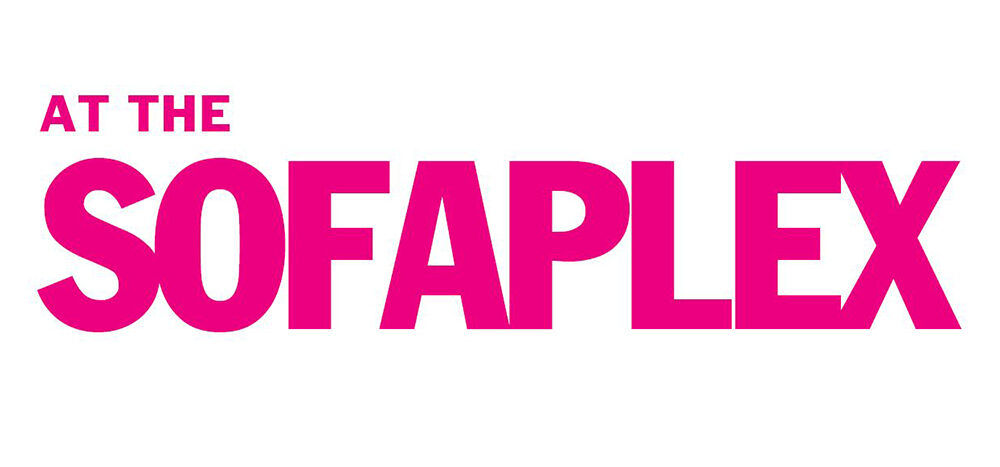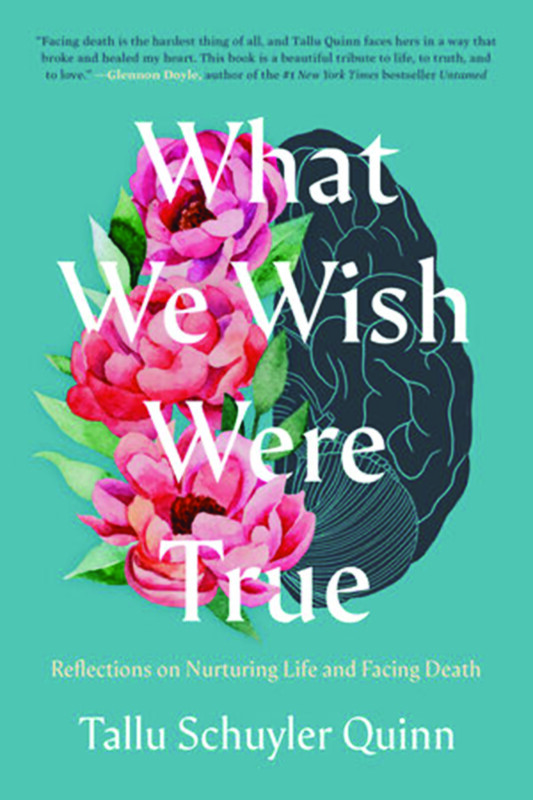What We Wish Were True, by Tallu Schuyler Quinn (Convergent, 187 pages)
After Tallu Schuyler Quinn was diagnosed with cancer in the summer of 2020, she started a journal on Caring Bridge, a website where people struggling with an illness (or their families) can share updates on their condition.
It’s hard to see how she had time — or frankly, the capacity — to write.
Quinn, who had just turned 40 when she became ill, was the leader of a nonprofit she had founded a decade earlier, the Nashville Food Project, and was married with two young children. Her diagnosis was stage IV glioblastoma, an aggressive form of brain cancer, and doctors removed a tumor “the size of a big meaty fist.” The surgery extended her life slightly but also knocked out part of her vision and some of the gray matter that processes words.
“Almost overnight I have had to let a lot of things go,” Quinn wrote. “I’m not cooking as much, I can’t drive any longer, my gardens are overgrown, I can’t really help my kids with their schoolwork, and my own writing comes with a new difficulty and requires a new effort.”
Her cancer battle was relatively short; Quinn died in February. Unlike another young mother and author with a stage IV cancer diagnosis, Kate Bowler (Everything Happens for a Reason, and Other Lies I’ve Loved), she didn’t get to see her finished book, which is a collection of short essays about her life, her work and her dying.
It’s a surprisingly upbeat book, given the subject and Quinn’s frank disclosures about her deteriorating condition and her profound grief. She believed in God and even had a master’s degree from a seminary, but was not willing to go gently into the dark night. But she found a way to be grateful for life even as she grieved how the tumors “mix me up in these sad and terrible ways.” She writes of wailing her thanks to God as salty tears poured into her mouth. Whatever the tumors took from her, they left the gift of poetry.
Although Quinn had earned a degree in papermaking and bookbinding, before cancer, she had not planned on being a writer. “After graduating from seminary, with a diploma in hand from a reputable institution, I did what any promising ministerial student would do: I moved to Boston with my friends and started working at a grocery store.” On the night shift, stocking shelves and throwing out aging meat, she started thinking about food waste and spent resources and the immorality of it all. These ideas would later percolate as part of her vision to feed hungry people in Tennessee, but first she spent six months working in Nicaragua, witnessing the kind of need that many Americans never encounter. She tells a wonderful story of a ride in a truck where they kept stopping to pick up people who asked if they could catch a ride, too. “If there’s only one thing I understand from living there, it’s that no expectation of how much I can carry or ask another to carry for me is too swollen,” she writes. It’s apropos of nothing, and everything at the same time.
This is stage IV brain cancer: Weight gain from steroids. Acne. Nausea. Nasal passages so dry they bleed. Constant bruising. Itchy skin. Sleepless nights. Lost words. Confusion. Prayers offered in tears instead of words. Yet still a primal urge to hold onto life. “I am sicker than I have ever been and am still faithfully, scrappily striving to heal. My lips hurt. My throat is dry. My skin is cracked. Come drink this broth with me and we can get quiet.”
Quinn writes that is incredibly lonely being so sick, but at the same time, she is ultimately sustained by the community that springs forth to help her. The quote she chooses for the beginning of the book is from Gunilla Norris’s Becoming Bread: “We become who we are, together, each needing the other. Alone is a myth.”
It’s unclear how much help, if any, Quinn had in writing this book; it’s clear that she was rapidly deteriorating in her final months; she died in hospice and did not enter any new journal entries on Caring Bridge toward the end. The last two pages of the book are her imagining what death might be like, coming back as a leaf, a pelican, a star, a song or a quilt. It feels petty to ask for more from a dying woman writing a book, but I still wished for dates on the essays, some sense of when they were written, given the quick trajectory of her illness. And I also wished for a coda of sorts from her family. For a memoir as intensely personal as this is, Quinn departs too abruptly from it, as from her life. Still, it’s a deeply moving reflection on mortality, a snapshot of an ordinary person who was asked by life to endure something horrible and did so wreathed in courage. B+
Book Notes
New England is well-represented in publishing this spring, with a lovely new reflection from New Hampshire author Sy Montgomery, a smart thriller set in Vermont and a memoir from a former flight attendant who grew up in Rhode Island.
Montgomery’s latest offering is The Hawk’s Way(Atria, 79 pages). Props to her and her publisher for revealing on the cover that the narrative of the slim volume was originally published as a chapter in her 2010 book Birdology (Atria, 272 pages). It’s common for accomplished authors to present previously published material in a new book (as Ann Patchett did recently in These Precious Days) but unusual for this to be revealed right up front.
In this case, however, the repackaging makes perfect sense. The story is a taut and gorgeous telling of Montgomery’s friendship with a renowned local falconer and her own grappling of conscience with a majestic beast of prey and what they represent. (The falconer, Nancy Cowan of Deering, was founder of the New Hampshire School of Falconry and died earlier this year.) There are also 16 pages of color photographs. It’s a great gift for any bird lover in your life.
The novel is The Children on the Hill (Gallery/Scout, 352 pages) by Jennifer McMahon, which has been described as a modern take on Frankenstein. Fellow Vermont author Chris Bohjalian has called McMahon, the author of 10 novels, “a literary descendant of Shirley Jackson.” The story involves three children (two siblings and another child brought into the family by their grandmother) who are obsessed with monsters; one grows up to have a podcast called “The Monsters Among Us” and she returns to her Vermont hometown to investigate a crime and reported monster sightings. There’s buzz about a Gone Girl-worthy plot twist that makes this an especially satisfying read.
Finally, Fly Girl (W. W. Norton, 288 pages) is the book you want to read on your next flight in hopes of getting special attention from flight attendants.
Ann Hood, a native of Warwick, Rhode Island, went to work for TWA in 1978, when flight attendants were still called stewardesses and advertised as onboard “sex kittens,” she writes. Hood is an accomplished memoirist and author, but says when she meets people socially, they’re more interested in hearing about her years as a flight attendant than her writing. This is her answer to everything we want to know.
Book Events
Author events
• DONALD ANTRIM Author presents One Friday in April. Gibson’s Bookstore, 45 S. Main St., Concord. Tues., May 17, 6:30 p.m. Visit gibsonsbookstore.com or call 224-0562.
• R.W.W. GREENE Author presents Mercury Rising. Bookery, 844 Elm St., Manchester. Fri., May 20, 5:30 p.m. Visit bookerymht.com or call 836-6600.
• TAMMY SOLLENBERGER Author presents The One Inside: 30 Days to Your Authentic Self. Bookery, 844 Elm St., Manchester. Wed., June 1, 6 p.m. Visit bookerymht.com or call 836-6600.
• PAUL BROGAN Author presents A Sprinkling of Stardust Over the Outhouse. Gibson’s Bookstore, 45 S. Main St., Concord. Thurs., June 30, 6:30 p.m. Visit gibsonsbookstore.com or call 224-0562.
• CASEY SHERMAN Author presents Helltown. Bookery, 844 Elm St., Manchester. Sun., Aug. 14, 1:30 p.m. Visit bookerymht.com or call 836-6600.
Book sales
• SPRING BOOK SALE Bag sale features thousands of hardbacks and paperbacks including fiction, nonfiction, mystery and a variety of children’s books, plus a large selection of DVDs, CDs and audio books. Baked goods will also be sold. Brookline Public Library, 4 Main St., Brookline. Sat., May 14, and Sun., May 15, from 10 a.m. to 2 p.m.
Poetry
• DOWN CELLAR POETRY SALON Poetry event series presented by the Poetry Society of New Hampshire. Monthly. First Sunday. Visit poetrysocietynh.wordpress.com.
Writers groups
• MERRIMACK VALLEY WRITERS’ GROUP All published and unpublished local writers who are interested in sharing their work with other writers and giving and receiving constructive feedback are invited to join. The group meets regularly Email [email protected].
Writer submissions
• UNDER THE MADNESS Magazine designed and managed by an editorial board of New Hampshire teens under the mentorship of New Hampshire State Poet Laureate Alexandria Peary. features creative writing by teens ages 13 to 19 from all over the world, including poetry and short fiction and creative nonfiction. Published monthly. Submissions must be written in or translated into English and must be previously unpublished. Visit underthemadnessmagazine.com for full submission guidelines.
Book Clubs
• BOOKERY Monthly. Third Thursday, 6 p.m. 844 Elm St., Manchester. Visit bookerymht.com/online-book-club or call 836-6600.
• GIBSON’S BOOKSTORE Online, via Zoom. Monthly. First Monday, 5:30 p.m. Bookstore based in Concord. Visit gibsonsbookstore.com/gibsons-book-club-2020-2021 or call 224-0562.
• TO SHARE BREWING CO. 720 Union St., Manchester. Monthly. Second Thursday, 6 p.m. RSVP required. Visit tosharebrewing.com or call 836-6947.






